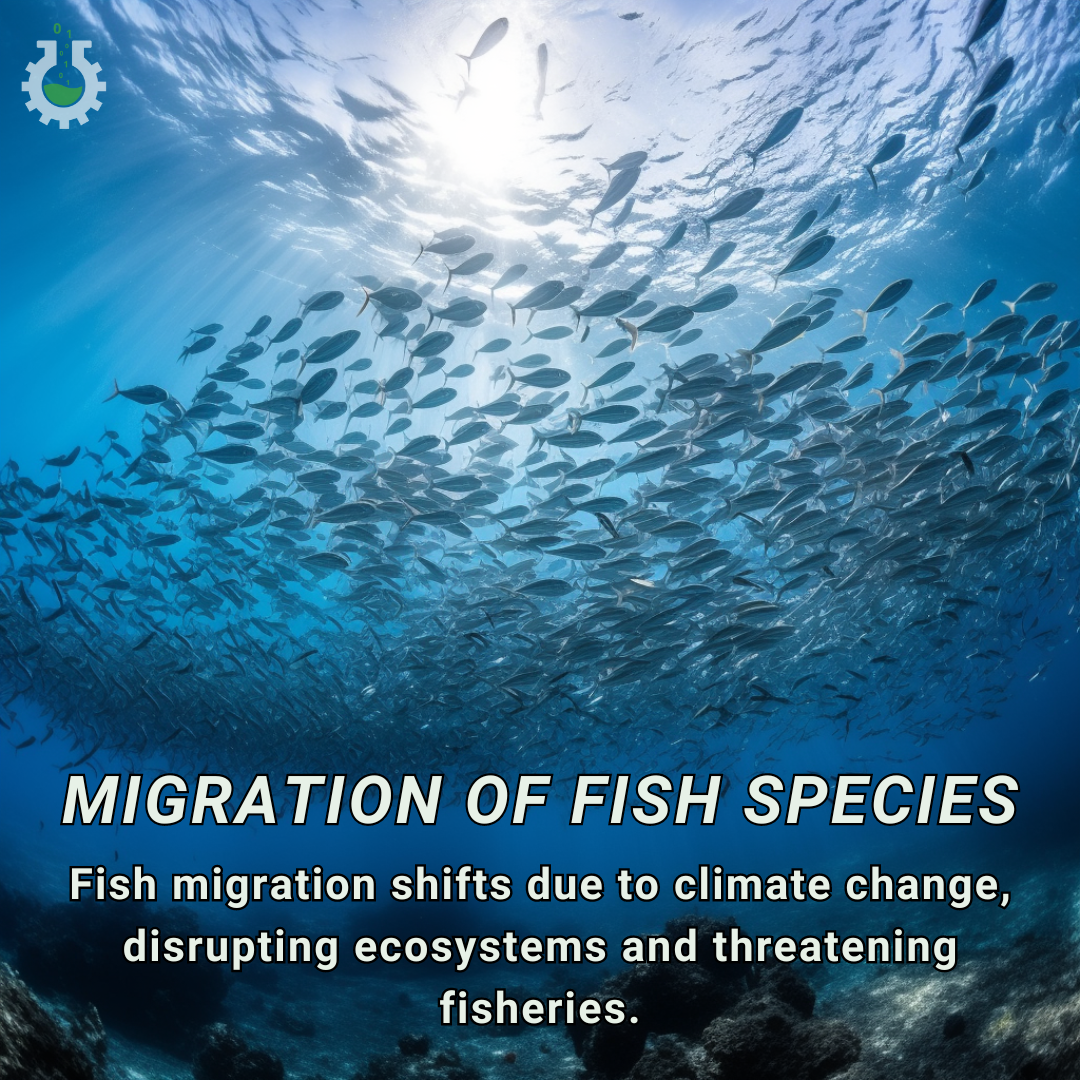August 13, 2024
Climate Change Poster Collection of the Day – Migration of Fish Species
Book a Demo
This week’s Climate Change Poster Collection focus on Migration of Fish Species. Migration is a fundamental behavior in many fish species, driven by the need to find optimal conditions for feeding, breeding, and survival. Traditionally, fish migration patterns have been relatively stable, influenced by factors such as water temperature, salinity, and the availability of prey. Many species undertake long-distance migrations, moving from spawning grounds to feeding areas and back again, often with remarkable precision and timing. These migrations are crucial for maintaining healthy populations and ensuring the sustainability of marine ecosystems. However, the advent of climate change is disrupting these established patterns, leading to significant and often unpredictable shifts in fish migration.
Climate change is profoundly altering the delicate balance of marine ecosystems, leading to significant shifts in the migration patterns of fish species worldwide. As global temperatures rise, oceanic conditions such as water temperature, salinity, and oxygen levels are changing at unprecedented rates. These alterations are compelling many fish species to migrate towards cooler waters, often poleward or to greater depths, in search of suitable habitats. This phenomenon is not just a matter of geographical relocation; it has far-reaching ecological and socio-economic implications. The migration of fish species due to climate change can create imbalances in marine ecosystems. Native species may face increased competition for resources, potentially leading to declines in biodiversity. The introduction of new species into ecosystems can disrupt existing food webs, as predators and prey must adapt to new dynamics. For example, the arrival of warm-water species in traditionally cooler regions can alter the availability of prey for native predators, leading to cascading effects throughout the ecosystem. Additionally, the shifting patterns of fish migration can impact the reproductive success of certain species, as they may struggle to find suitable spawning grounds or face increased predation in unfamiliar territories.
The socio-economic implications of changing fish migration patterns are profound. Traditional fishing grounds are becoming less productive, disrupting the livelihoods of coastal communities that rely heavily on fishing for sustenance and economic activity. As fish populations move, fishermen may need to travel further and invest in new equipment, increasing operational costs. This can be particularly challenging for small-scale fisheries, which may lack the resources to adapt to these changes. Furthermore, the migration of fish species impacts global food security, as changes in the availability and distribution of fish stocks affect supply chains and market dynamics. For example, species like cod and haddock, which were once abundant in certain regions, are now becoming scarce, while other species may proliferate, altering the composition of marine biodiversity. The shifting patterns of fish migration pose significant challenges for fisheries management and conservation efforts. Regulations and policies that were once effective may no longer be applicable, as the distribution of fish stocks changes. This necessitates adaptive management strategies that can respond to the dynamic nature of marine ecosystems. International cooperation is also crucial, as many fish species migrate across national boundaries. Effective management requires robust scientific research to monitor and predict future changes, as well as the development of flexible policies that can accommodate the uncertainties associated with climate change.
The migration of fish species due to climate change has significant implications for global food security. As fish populations move, the availability of certain species in different regions can fluctuate, impacting supply chains and market dynamics. For instance, the decline of traditionally abundant species like cod and haddock in certain areas can lead to shortages and increased prices, affecting consumers and businesses alike. Conversely, the proliferation of other species may create new opportunities for fisheries, but also requires adaptation to new market demands and preferences. Ensuring a stable and sustainable supply of seafood in the face of these changes is a complex challenge that requires coordinated efforts across the entire supply chain. The ripple effects of changing fish migration patterns extend to the broader marine food web, affecting predators and prey alike, and ultimately influencing the health of the entire ocean ecosystem. For example, the movement of key prey species can impact the distribution and abundance of larger predators, such as marine mammals and seabirds, which rely on these fish for food. Changes in the timing and location of fish migrations can also affect the reproductive success of these predators, as well as the overall productivity of marine ecosystems. Understanding these complex interactions and their implications for marine biodiversity is crucial for developing effective conservation strategies.
Addressing the challenges posed by climate change and fish migration requires a multifaceted approach. Adaptive management strategies are essential for responding to the dynamic nature of marine ecosystems. This includes the development of flexible policies and regulations that can accommodate the uncertainties associated with climate change. International cooperation is also crucial, as many fish species migrate across national boundaries, requiring coordinated efforts to ensure sustainable management. Robust scientific research is needed to monitor and predict future changes, as well as to develop innovative solutions for mitigating the impacts of climate change on fish migration. As we navigate the complexities of a warming planet, understanding and mitigating the impacts of climate change on fish migration is crucial for preserving marine biodiversity, ensuring sustainable fisheries, and protecting the livelihoods of those who depend on the ocean’s resources. The migration of fish species is a dynamic and complex process, influenced by a multitude of factors, and climate change is adding an unprecedented layer of complexity. By adopting adaptive management strategies, fostering international cooperation, and investing in robust scientific research, we can work towards a sustainable future for our oceans and the communities that rely on them.
Discover an inspiring collection of climate change poster.



